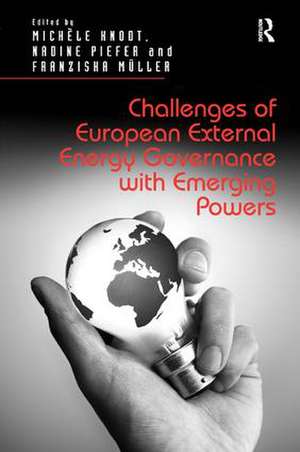Challenges of European External Energy Governance with Emerging Powers
Editat de Michèle Knodt, Nadine Pieferen Limba Engleză Hardback – 28 oct 2015
Preț: 772.23 lei
Preț vechi: 1107.51 lei
-30% Nou
Puncte Express: 1158
Preț estimativ în valută:
147.81€ • 160.61$ • 124.24£
147.81€ • 160.61$ • 124.24£
Carte tipărită la comandă
Livrare economică 21 aprilie-05 mai
Preluare comenzi: 021 569.72.76
Specificații
ISBN-13: 9781472458292
ISBN-10: 147245829X
Pagini: 402
Ilustrații: Includes 63 b&w illustrations
Dimensiuni: 156 x 234 x 32 mm
Greutate: 0.9 kg
Ediția:New ed.
Editura: Taylor & Francis
Colecția Routledge
Locul publicării:Oxford, United Kingdom
ISBN-10: 147245829X
Pagini: 402
Ilustrații: Includes 63 b&w illustrations
Dimensiuni: 156 x 234 x 32 mm
Greutate: 0.9 kg
Ediția:New ed.
Editura: Taylor & Francis
Colecția Routledge
Locul publicării:Oxford, United Kingdom
Notă biografică
Michèle Knodt is Jean Monnet Professor for European Integration and Comparative Politics at the Technische Universität Darmstadt, Germany. She works on the new role of Emerging Powers in international politics with a special focus on energy and triangular cooperation. Furthermore, her research interests include EU external democracy promotion in Central Asia and Southern Caucasus as well as Civil Society Engagement in the European Multilevel System. Nadine Piefer is a Researcher at the Department of Political Science at the Technische Universität Darmstadt, Germany, and a freelance Consultant. Her research and consultancy work focuses on EU foreign and energy relations with the BICS, new development partners and triangular cooperation. She has research and practical experience in South Africa, Mexico, Brazil, India, China and Germany. Franziska Müller is a Post-doctoral Research Fellow at the University of Kassel, Germany. Her PhD analyzed governmentality and normative power within EU-ACP relations. Her research interests include EU relations with Emerging Powers, poststructuralist and postcolonial IR theory, international aid governance, and qualitative social research. Her current work focuses on IRENA's role for a global energy transition, thereby exploring transformations of North-South relations at the energy/development nexus.
Recenzii
’An authoritative and lucid description of priority issues underlying European energy governance with emerging powers. This energy dialogue among a distinguished group of international experts builds on sound technical analysis and in-depth empirical knowledge. It highlights the mutual benefits of energy partnerships, multilateral policymaking and strategic vision in an increasingly resource-scarce and multipolar world. A must read for decision-makers, researchers and the concerned public.’ Mohan Munasinghe, Chairman, Munasinghe Institute for Development (MIND), Sri Lanka; 2007 Nobel Peace Prize Laureate on behalf of the IPCC (shared with Al Gore) ’This book systematically applies a sophisticated research design combining in-depth empirical work with rigorous methodology and theoretical explanations in all chapters. The contributors examine one of the major global challenges of the 21st century: energy relations between Europe and large emerging powers, such as Brazil, India, China and South Africa. The edited volume is thematically coherent and presents an impressive integrated connected analysis.’ Martin Holland, University of Canterbury, Christchurch, New Zealand
Cuprins
I: Introduction; 1: Introduction; 2: Conceptualizing Emerging Powers and EU Energy Governance; 3: EU and Emerging Powers in Energy Governance; II: European Energy Governance; 4: Explaining European Union External Energy Governance with Emerging Powers; 5: Bilateral EU Member States' Energy Cooperation with Emerging Powers; 5_1: Denmark's Energy Cooperation with Emerging Powers; 5_2: Germany's Energy Cooperation with Emerging Powers; 5_3: Britain's Energy Cooperation with Emerging Powers; 5.4: Spain's Energy Cooperation with Emerging Powers; III: EU External Energy Relations with China, India, Brazil, South Africa; 6: China-EU Energy Governance; 7: India-EU Energy Relations; 8: Brazil-EU Energy Governance; 9: South Africa-EU Energy Governance; IV: Communicative Challenges of EU-Emerging Powers Energy Relations; 10: More Than Only Words; 11: Energy Poverty and Policy Coherence in India; V: Non-state Actors within EU-Emerging Powers Energy Relations; 12: The Governance of International Technology Transfer; 13: Private Actors in Transnational Energy Governance; VI: Multilateral and Regional Embededdness of the EU and Emerging Powers in Energy Governance; 14: International Energy Governance Revisited; 15: IRENA's Renewable Energy Governance; VII: Concluding Remarks and Policy Recommendations; 16: Understanding EU-Emerging Powers Energy Governance; 17: Policy Recommendations for Enhanced EU-Emerging Powers Energy Cooperation
Descriere
Resulting from three years of international, interdisciplinary research cooperation among academics and practitioners in Europe and the BICS countries within a project funded by the Volkswagen Foundation, this volume addresses one of the greatest global challenges. Specific focus lies on the bilateral energy dialogues and Strategic Partnerships between the EU and Emerging Powers regarding bilateral, inter- and transnational energy cooperation. Furthermore, the analysis provides policy recommendations in order to tap the full potential of energy cooperation between the EU and Brazil, India, China and South Africa.
